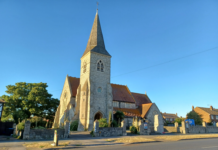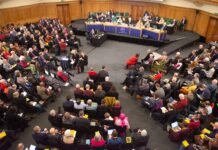Three bishops have signed a Presentment alleging Bishop Atkinson of the Via Apostolica Missionary District has violated Title IV Canon 2 of the Anglican Church in North America. Bishop Atkinson has been inhibited from ministry pending the outcome of the Title IV process.
The Presentment and Inhibition came after a unanimous recommendation from the Provincial Investigative Team tasked with looking into allegations against Bishop Atkinson of misconduct brought to the Archbishop’s attention.
Background
In the Fall of 2021, allegations of misconduct, including the abuse of ecclesiastical power, were made against Bishop Todd Atkinson of the Via Apostolica Missionary District, based in Alberta, Canada. Bishop Atkinson went on a leave of absence and Bishop Quigg Lawrence, Bishop Suffragan of the Diocese of Christ Our Hope, was appointed by the Archbishop to provide episcopal care to the clergy of Via Apostolica. In addition, a Provincial Investigative Team was formed to look into these matters. Members of this team were: Dr. Joan Deeks, Mrs. Erin Folk, the Rev. Dr. Chad Graham Esq., the Rev. Canon Andrew Gross, the Rt. Rev. Dr. David Hicks, Ms. Rachel Thebeau, Esq. (You can learn more about those team members here.)
The responsibility of the Provincial Investigative Team–Via (PIT-Via) was to listen carefully, investigate, and make recommendations to the Archbishop. Based on what was found, the PIT-Via could make one or more of the following recommendations:
1. Find there is exonerating information or there is insufficient information to proceed.
2. Recommend that the Archbishop consider giving what is called in the canons a “Godly Admonition.” A Godly Admonition may require a bishop to undergo counseling, training, or some other form of remediation.
3. Recommend a process requiring work be done by the bishop and Bishop’s Council of Via Apostolica leading to a restored working relationship or to the dissolution of the relationship.
4. Recommend that concerns go through the Title IV disciplinary process in the ACNA canons. This process may involve presentment, further investigation, and possible trial before an ecclesiastical (church) court. In this process, a bishop can make his case or choose to submit to discipline.
The Process
The Provincial Investigative Team-Via received testimony from over forty individuals, and those disclosures made to the Provincial Investigative Team have been held in strict confidence. The Title IV process will include the testimony of only those individuals who have given or will give permission for their disclosure to be used and the PIT-Via has recommended that names and identifying information of those persons remain confidential to the extent possible without hindering due process.
The Recommendation
The Provincial Investigative Team unanimously recommended to the Archbishop that the Title IV processes be initiated. Archbishop Beach received this recommendation and subsequently three bishops reviewed the Investigative Team’s findings and signed charges of Presentment. The Presentment consists of four charges under Canon IV.2.4: “Conduct giving just cause for scandal or offense, including the abuse of ecclesiastical power.” When a Presentment is filed against a bishop, the canons require the Archbishop to select a Board of Inquiry to evaluate the charges and the evidence and determine if there are reasonable grounds for the case to go to trial. Archbishop Beach is in the process of selecting this panel of five Presbyters (priests) and five baptized members in good standing.
Based upon the seriousness of the charges and the strength of the evidence gathered to date, four of the most senior bishops of the Anglican Church in North America by date of consecration believed it to be warranted that Bishop Atkinson be inhibited from all ministry pending the outcome of these processes.
What could happen next?
The Board of Inquiry will look at the evidence gathered to date and may commission further investigation. When the Board of Inquiry believes it has enough information to make a decision, it will then determine if there are reasonable grounds for the case to go to trial.
If the matter goes to trial, the Court for the Trial of a Bishop, which is elected by the Provincial Council, will hear the case. (You can learn more about the members of the Trial Court here.)
At any point in this process, the accused may plead guilty to the charges filed in the Presentment.
If the accused is found guilty, either by admission or by trial verdict, the findings go to the College of Bishops for sentencing.
According to Canon IV.8.3, the sentence shall be:
1. Censure and/or admonishment;
2. Suspension, for a definite period, not to exceed five years;
3. Suspension for life; or
4. Deposition from the sacred ministry.
If the Board of Inquiry determines there is not sufficient evidence to go to trial, or if the Trial Court finds the accused not guilty, the inhibition may be lifted and the bishop may return to ministry. As the process is ongoing, Bishop Atkinson has been appointed an individual to provide pastoral care and a second individual to serve as his canonical adviser. If the case goes to trial, the Archbishop will appoint a prosecutor and a canonical adviser to the Court. The Complainants have been appointed support persons to walk with them through this process.




[…] Supply hyperlink […]